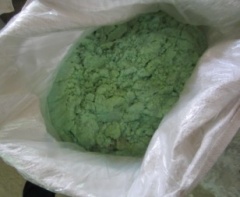Copperas
| Infobox on Copperas | |
|---|---|
| Example of Copperas |  |
| Facts | |
| Origin | - |
| Stowage factor (in m3/t) | - |
| Humidity / moisture | - |
| Ventilation | - |
| Risk factors | See text |
Copperas
Description
Iron (ferrous) sulphate comprises greenish or yellow-brown crystals or granules, odourless in water with saline taste, insoluble in alcohol.
Iron sulfate or Ferrous Sulfate is the chemical compound with the formula FeSO4. It is used medically to treat iron deficiency, and also for industrial applications. Known since ancient times as copperas and as Green Vitriol, the blue-green heptahydrate is the most common form of this material. All iron sulfates dissolve in water to give the same aquo complex [Fe(H2O)6]2+, which has octahedral molecular geometry and is paramagnetic.
In the finishing of steel prior to plating or coating, the steel sheet or rod is passed through pickling baths of sulfuric acid. This treatment produces large quantities of Iron Sulfate as a by-product.
Another source of large amounts results from the production of titanium dioxide from ilmenite via the sulfate process. Ferrous Sulfate is also prepared commercially by oxidation of pyrite:
On heating, iron sulfate first loses its water of crystallization and the original green crystals are converted into a dirty-yellow anhydrous solid. When further heated, the anhydrous material releases sulfur dioxide and white fumes of sulfur trioxide, leaving a reddish-brown Iron Oxide. Decomposition of iron sulfate begins at about 480°C.
Industrially, ferrous sulphate is mainly used as a precursor to other iron compounds. It is a reducing agent, mostly for the reduction of chromate in Cement.
(Other) use: iron oxide pigment, iron salts, ferrites, water and sewage treatment, catalyst especially for synthetic ammonia, fertilizer, feed additive, Flour enrichment, reducing agent, herbicide, wood preservative, process engraving.
Shipment / Storage / Risk factors
Green crystals usually shipped in bags or casks. Used in the manufacture of inks and dyes.
Liable to rot bags or other containers, with consequent loss through seepage. Should be stowed away from moist goods. Affected by humidity.
Consult the applicable MSDS sheet.











